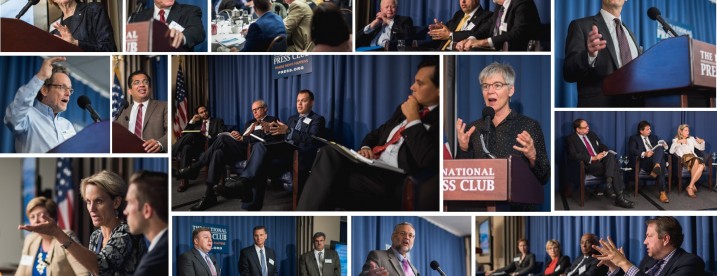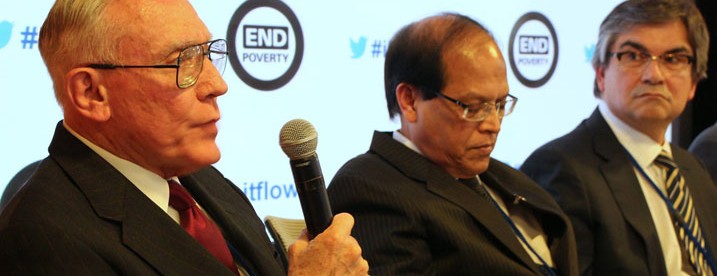By Tom Cardamone, October 6, 2015

A Quarterly Newsletter on the Work of Global Financial Integrity from June to September 2015
Global Financial Integrity is pleased to present
GFI Engages, a quarterly newsletter created to highlight events at GFI and in the world of illicit financial flows. We look forward to keeping you updated on our research, advocacy, high level engagement, and media presence. The following items represent just a fraction of what GFI has been up to since March, so make sure to check our
website for frequent updates.
Global Financial Integrity Conference: Illicit Financial Flows: The Most Damaging Economic Problem Facing the Developing World
Based on the culmination of work GFI has done with the support of the Ford Foundation including a book by GFI, the conference included discussions and keynote remarks from experts on the nature of IFFs, country-level perspectives, and how and why curtailing these IFFs should be a priority for the global community.
By Joseph Spanjers, November 21, 2014

Mexico and Bangladesh Voice Support for a Clear Target on Curbing Illicit Financial Flows on the Sustainable Development Agenda
The United Nations is in the process of forming the post-2015 development agenda. These proposed Sustainable Development Goals (SDGs) will eventually replace the Millennium Development Goals (MDGs) that were agreed upon for 2000-2015. As with the MDGs, the SDGs will inform which development issues take priority in the coming years.
Sustainable Development Goal 16.4, as is currently proposed by the UN’s Open Working Group, calls on the international community to:
“by 2030 reduce illicit financial and arms flows, strengthen recovery and return of stolen assets, and combat all forms of organized crime.”
Global Financial Integrity (GFI) applauds the Open Working Group for considering illicit financial flows in its proposal. Though Goal 16.4 is definitely a start in the right direction, it is not exclusively focused on illicit financial flows, nor is it measurable in the least. GFI proposes the following as an alternative:
“by 2030, reduce illicit financial flows related to trade misinvoicing by 50%.”
WASHINGTON, DC – As the world observes International Anti-Corruption Day this Sunday, December 9, 2012, Global Financial Integrity highlighted some of the most notable achievements, developments, and short-comings in the fight against corruption over the past year.
WASHINGTON, DC – A letter published yesterday by two influential U.S. Congressmen suggests that Wal-Mart de Mexico (Walmex), the Mexican subsidiary of U.S. retailer Wal-Mart Stores Inc., which recently came under fire for possible violations of the Foreign Corrupt Practices Act, may have been engaged in money laundering and tax evasion in Mexico.
WASHINGTON, DC – Global Financial Integrity applauded the Senate Permanent Subcommittee on Investigations today on this week’s hearing, “U.S. Vulnerabilities to Money Laundering, Drugs, and Terrorist Financing: HSBC Case History.” The hearing painted a picture of a bank that chose profit over protection, failing to apply legally mandated anti-money laundering protections to many of its accounts.
Greece Lost US$160 Billion to Illicit Financial Outflows over Past Decade
WASHINGTON, DC – Global Financial Integrity (GFI) today called upon G20 leaders meeting this week in Los Cabos, Mexico to tackle the issue of tax haven secrecy and the illicit financial flows it facilitates as a necessary means to ensuring stability in the international financial system.
The United States has a strong national interest in economic, political and civil stability in Mexico. Its war against transnational drug cartels has dramatically highlighted Mexico’s problems, but the truth is that the nation has had deep, unsolved, structural problems in its economy and an opaque international financial system for decades.
Global Financial Integrity’s report on Mexico found that $872 billion in illicit finances left the country from 1970 through 2010. Although some laundered drug money may be included in that figure, it overwhelmingly represents tax evasion by both domestic and multinational corporations doing business in Mexico, as well as corruption, kickbacks and bribery from wealthy Mexican public officials and business leaders.
TO THE EDITOR:
Holman W. Jenkins Jr.’s ambivalent portrait of the Wal-Mart of Mexico bribery scandal in his April 25 Business World column “Wal-Mart Innocents Abroad” overlooks the fact that bribery is not a victimless crime. If the allegations are true, Wal-Mart was bribing local government bureaucrats to skirt environmental regulations, rewrite zoning laws and intentionally expand itself faster than any of its competitors could possibly, legally, match.


